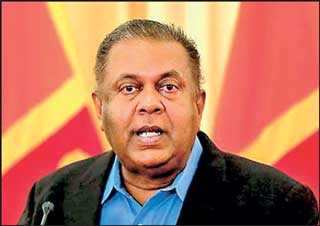Saturday Feb 21, 2026
Saturday Feb 21, 2026
Thursday, 30 April 2020 00:00 - - {{hitsCtrl.values.hits}}
Former Finance Minister Mangala Samaraweera has written to President Gotabaya Rajapaksa, urging him to exercise his powers as the Head of State at this critical time and summon Parliament as soon as possible, saying the Government has no legal right to bear public expenditure after 30 April 2020, and additional funds must be approved by Parliament.
 |
Former Finance Minister Mangala Samaraweera |
“I kindly request you to exercise your powers as the Head of State at this critical time to summon the Parliament as soon as possible, with the support of all parties represented in Parliament, and to have the essential expenditure, including the payment of salaries to the public service after 30 April 2020, approved legally and constitutionally so that Sri Lanka acts responsibly, respecting the Constitution in relation to public finances.”
“Failure to do so, especially at a time of a pandemic, is bound to have serious repercussions for the short and long-term economic well-being of our people, especially in light of international obligations and the nature of the interconnected global financial and economic system.”
Samaraweera, who presented the Vote on Account for the State expenditure of Sri Lanka up to 30 April 2020 last year when he served as Finance Minister, said that in the years when a Presidential Election is forthcoming, successive Governments have refrained from passing a Budget, leaving an opportunity for the winning President to submit his own Budget.
He explained that as the Presidential Election was scheduled to be held on 16 November 2019, the then-Government presented a Vote on Account to Parliament for a period of four months from 1 January 2020 to 30 April 2020, and adopted it on 23 October 2019, leaving an opportunity for the President-elect to present his own Budget.
The letter noted that the Finance Minister appointed by the newly-elected President did not present a Budget for 2020 until Parliament was dissolved on 2 March, in spite of the fact that the President assumed office in November 2019, over three months prior to the dissolution of Parliament. “As you would recall, the then-President Mahinda Rajapaksa, who also held the portfolio of Finance, did not present the Budget for 2015, since the Presidential Election was scheduled in November 2014 for 8 January 2015. Therefore, I would like to remind you that the good governance Government that won the Presidential Election on 8 January 2015 presented a budget for the financial year 2015 within 21 days of its election.”
“Instead of presenting an Appropriation Bill for the year 2020, prior to dissolution of the Parliament on 2 March 2020, a proposal was brought by the Government to amend the Vote on Account, which had already been passed by the Yahapalanaya Government. Thereafter it was withdrawn, after the Opposition in Parliament pointed out that there was no provision in the Standing Orders for such an Amendment. Now, as a result of the failure to present the Budget, due to reasons known only to the Government, and the sudden emergence of the coronavirus (COVID-19), the country is afflicted with a pandemic in addition to legislative and economic crises,” Samaraweera said in the letter sent to the President on Tuesday.
“I urge that by virtue of the Vote on Account passed on 23 October 2019, the Constitution clearly states that the Government of Sri Lanka has no legal right to bear public expenditure after 30 April 2020. As Parliament shall have full control over public finance, no sum shall be withdrawn except under the authority of a warrant under the hand of the Minister in charge of the subject of Finance. No such grant can be issued by the Minister of Finance without such approval, and it is unlawful for the Secretary to the Treasury to spend public money for any purpose without the approval of the Minister of Finance,” the letter added.
Samaraweera said that Article 150 (3) of the Constitution of the Democratic Socialist Republic of Sri Lanka provides for the incurring of Government expenditure in the event of the dissolution of Parliament and in the context of an Appropriation Bill not being passed in Parliament, which reads as: “Where the President dissolves Parliament before the Appropriation Bill for the financial year has passed into law, he may, unless Parliament shall have already made provisions, authorise the issue from the Consolidated Fund and the expenditure of such sums as he may consider necessary for the public services until the expiry of a period of three months from the date on which the new Parliament is summoned to meet.”
The President is authorised to spend money from the Consolidated Fund in terms of the provisions provided in the Constitution only until the expiry of three months from the date on which the new Parliament is summoned to meet. But the due date for the new Parliament to meet has not yet been officially announced by the President, the letter noted.
Samaraweera also noted that the President, Prime Minister, Cabinet of Ministers and the Members of Parliament, as well as all public officials, including the Secretary to the Treasury, have pledged to uphold and defend the Constitution of the Republic.
“Any person who acts in contravention of the provisions on conviction by the Court of Appeal shall be subject to:- (c) Civic disability for such period not exceeding seven years and (d) Forfeit his movable and immovable property other than such property as is determined as being necessary for the sustenance of such person and his family,” the letter said.